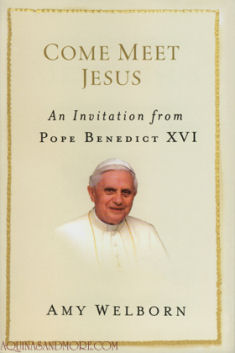
|
Posted March 24, 2010
Book: Come Meet Jesus: An Invitation from Pope Benedict XVI Author: Amy Welborn The Word Among Us Press. Ijamsville, MD. 2010. Pp. 153 An Excerpt from the Introduction
He has spoken to hundreds of thousands of young people around the world, to small groups of the sick and disabled, to ambassadors, university faculties, priests and religious, children, the faithful gathered at places of pilgrimages, and the curious stopping by St. Peter’s Square on a warm Wednesday morning, wondering who this fellow is and what all the fuss could be about. Is it possible to pull a common thread from this rich, diverse body of works? I believe it is, and this book is the fruit of that conviction. His fellow academics have correctly discerned many fundamental themes in the work of theologian Joseph Ratzinger; an interest in the relationship between faith and reason, religion and culture, modernity and faith; the liturgy; and the continuity and discontinuity in historical development. A pope does not leave his own interests and expertise at the door of the Sistine Chapel when he is elected, so all these points of study that interested Joseph Ratzinger over his decades as an academic theologian continue to inform his writing as pope. However, when you listen and read the papal writings attentively, it is difficult not to notice one particular element that seems to come into focus no matter what the specific topic or who the audience is. That “element” is a person: Jesus Christ. Benedict made his focus clear from his first homily as pope. He referred to Pope John Paul II’s 1978 inaugural homily in which his predecessor exhorted his listeners to “Open wide the doors for Christ.” Benedict concluded his own homily in this way: If we let Christ into our lives, we lose nothing, nothing, absolutely nothing of what makes life free, beautiful, and great. No! Only in this friendship are the doors of life opened wide. Only in this friendship is the great potential of human existence truly revealed. Only in this friendship do we experience beauty and liberation. And so, today, with great strength and great conviction, on the basis of long personal experience of life, I say to you, dear young people: Do not be afraid of Christ! He takes nothing away, and he give you everything. When we give ourselves to him, we receive a hundredfold in return. Yes, open, open wide the doors to Christ — and you will find true life! . . . Come Meet Jesus highlights the ways in which Pope Benedict is inviting his listeners, both inside and outside the Catholic Church, to discover the saving, healing, life-giving love of Jesus. Pope Benedict’s words are not difficult to understand. He writes in a lucid, clear style. . . . This book is offered with the hope that more might be inspired to listen with open minds and hearts to Pope Benedict’s persistent and heartfelt invitation for all of us to put friendship with Jesus at the center of our lives. An Excerpt from the Book: No Accidents When we think about life’s meaning, it comes to us in (at least) two different ways. First, like the philosophers, we consider the general meaning of existence – why things exist, what the shape and nature of reality reveal about meaning, and so on. We also consider, more urgently, the reason for our own personal existence instead of nonexistence. Why did that random sperm and egg meet at that particular moment to create me? What if they hadn’t? The fact that even the very beginning of our existence seem so contingent on so many variables – on whether or not our parents ever met, or whether or not they were feeling romantic at that moment — can stop us in our tracks. If the difference between my existence and nonexistence was an extra glass of wine or an argument finally resolved, what meaning can that existence actually have? Mixed up with that type of meaning is the question of purpose. I’m here (however that happened) . . .so now what? Happiness, pleasure, satisfaction, sacrifice, accomplishment, contentment . . .is it about that? . . . The world gives plenty of answers. . . .To believe in a creator God, however, doesn’t mean we have to question the value or necessity of science or secular fields of study, or even randomness, chance, or chaos. All of which seem to play a role in the cosmos. Instead, it means placing explanations of the physical aspects of the world in their proper context: It is not the elemental spirits of the universe, the laws of matter, which ultimately govern the world and mankind, but a personal God governs the stars, that is, the universe; it is not the laws of matter and of evolution that have the final say, but reason, will, love — a Person. And if we know this Person and he knows us, then truly the inexorable power of material elements no longer has the last word; we are not slaves of the universe and of its laws, we are free. In ancient times, honest enquiring minds were aware of this. Heaven is not empty. Life is not a simple product of laws and the randomness of matter, but within everything and at the same time above everything, there is a personal will, there is a Spirit who in Jesus has revealed himself as Love. Table of Contents: 1. Meeting Pope Benedict 2. Meeting ourselves 3. Meeting Jesus in the meaning of life 4. Meeting Jesus in the scriptures 5. Meeting Jesus in the Life of the Church 6. Meeting Jesus in the liturgy 7. Meeting Jesus in the liturgical year 8. Meeting Jesus in prayer 9. Meeting Jesus in everyday life 10. Meeting Jesus in suffering and death |
|
